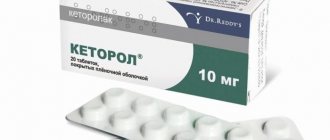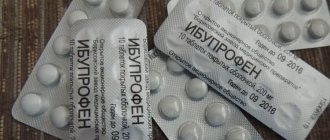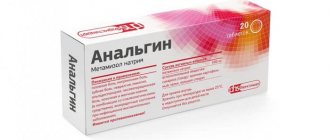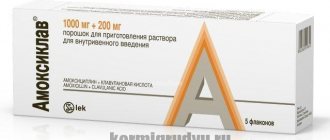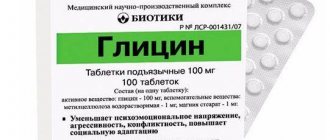A nursing mother, like anyone, can get a cold or flu. However, not all medications can be used while breastfeeding. According to WHO, the safest drug used to combat the symptoms of these diseases is paracetamol. Since it contains no dangerous substances, paracetamol is safe for mother and baby during lactation.
Description of the drug
The drug is white or cream-white tablets, the active ingredient of which is paracetamol. It acts as a prostaglandin blocker, resulting in a decrease in temperature, pain and inflammation.
Doctors choose this drug, since paracetamol during breastfeeding achieves the following goals:
- Reduces the severity of symptoms of the disease. Usually a woman begins to feel better within 10-15 minutes.
- Has a mild anti-inflammatory effect.
- It has a low concentration in breast milk, so it can be drunk up to three times a day.
- It is quickly eliminated from the body (after about 4 hours there is no longer any trace of it).
- It does not have a negative effect on the acid-base balance of the body and does not affect water-salt metabolism.
Milk
Milk reduces the effectiveness of some medications. This healthy drink is absolutely incompatible with antibiotics that are made on the basis of tetracycline (“Tetracycline”, “Oletetrin”, etc.). When milk is consumed, these medications form strong chemical compounds that do not have a therapeutic effect and pass through the digestive tract without being absorbed. Thus, up to 80% of the drug can simply leave the body without having a definite effect on the human condition.
Milk neutralizes potassium and antacids - drugs that are used to improve the functioning of the digestive system. Lincomycin, Pancreatin and Bisacodyl are difficult to absorb with milk - drugs that have an acid-resistant coating for absorption in the digestive tract.
It is worth noting that despite the inadmissibility of simultaneous use of the listed drugs with milk, the patient’s diet should always contain dairy products (for example, kefir), which have a positive effect on the functioning of the digestive system and can protect the intestines from damage caused by taking certain drugs (for example, antibiotics ).
Indications for use
During lactation, paracetamol should be taken to achieve the following goals:
- Decrease in temperature. Paracetamol should be taken for temperatures exceeding 38 degrees. If the mother’s temperature is lower, you should not take the medicine, since the body itself must mobilize its strength to fight the disease.
- Relieving headaches. Paracetamol can be prescribed for severe headaches while breastfeeding. If the mother has a slight headache, it is better for her to drink mint tea or take a walk with the baby. Taking a nap during the day can also help cope with the problem.
- Reducing the intensity of toothache. Paracetamol helps cope with severe toothache. At the same time, mom should not put off visiting the dentist.
- The drug can be used for severe pain in muscles and joints.
- Reducing pain if the mother is injured and suffers from pain.
Mothers should remember that whether it is possible to take paracetamol during breastfeeding should be decided by the doctor in each specific case.
Review of drugs with paracetamol
To reduce high fever, eliminate weakness, heat pain, and ARVI symptoms, use:
- "Cefekon-D" (in the form of suppositories, tablets);
- "Panadol" (tablets);
- "Efferalgan" (suppositories, syrup);
- "Perfalgan" (solution).
What is possible for fever during breastfeeding include combination medications with a lower content of paracetamol (Pentalgin, Coldrex). Despite the low concentration, the analogues reduce the temperature and alleviate the condition of fever, pain, and lethargy.
Drug treatment during lactation is acceptable. By following the recommendations of the attending physician and following the rules of administration, a nursing woman will quickly get in shape without harming the baby and maintaining her own strength. It is better to quickly recover with paracetamol than to suffer for a long time from powerlessness in caring for the baby.
Contraindications
Although paracetamol is a widely used drug, its use is prohibited in some cases. You should not take this medicine while breastfeeding in the following cases:
- For chronic diseases of the liver and kidneys, as well as if problems are detected in the functioning of these organs.
- For acute gastrointestinal diseases.
- For bronchial asthma.
- For blood diseases.
- If an individual allergic reaction to the active substance of the drug or its components is recorded.
Ways to prevent the disease at an early stage
Now you know that a nursing mother can take Paracetamol. But is it always needed? At the onset of the disease, you can do some simple procedures:
If the use of Paracetamol in case of illness becomes unavoidable, then the woman is prohibited from drinking coffee and strong teas. They can lead to an increase in the amount of the active substance of the drug in the body.
Paracetamol is known as a drug that is used to treat illness not only in nursing mothers, but also in infants. Scientists back in the 50s of the last century proved that the medicine relieves pain well and reduces high fever, with virtually no negative effect on the body. If you have a severe form of influenza or acute respiratory viral infection, nursing mothers can take Paracetamol without fear of complications.
Side effects
Although paracetamol can be taken during lactation, sometimes side effects may occur:
- lethargy and drowsiness;
- failures in the functioning of the kidneys and liver (both in mother and baby);
- asthma, allergies, wheezing in a child (the risk of this is about 20%).
That is why young mothers should take paracetamol with caution, monitoring their condition and the well-being of the baby.
Lack of general opinion about taking Paracetamol
Without fully understanding the positive and negative aspects of using the drug, many nursing mothers refuse to drink it, even with a terrible general condition. Women are confident that in this way they will prevent the negative effects of the drug on the baby’s body. In such a situation, they can cause more harm to themselves than one tablet of the drug.
Can a nursing mother take Paracetamol? Currently, there are constant discussions about its use. After all, nursing mothers need to refrain from taking any medications, and sometimes Paracetamol is no exception. Situations arise when you cannot do without it. Women should use Paracetamol during lactation when there is an urgent need for it.
When a mother is sick with a common cold, there is no threat to the child. If the condition is not critical, then you can do without Paracetamol.
The flu poses a particular danger to the health of the baby and mother. With this disease, taking an antipyretic drug is simply necessary.

Is it possible to take paracetamol while breastfeeding?
After conducting many studies, doctors have determined that paracetamol during breastfeeding is safe for mother and baby. Of course, if the mother complies with the prescribed dosage and the required interval between taking the medicine.
Many mothers are interested in how quickly paracetamol is eliminated from the body. It is excreted from milk within 3-4 hours. At this time, its concentration is less than one percent of the amount drunk by the patient.
Some mothers, when deciding whether it is possible to take paracetamol during breastfeeding, believe that it can harm the baby if it gets into the milk, and refuse to breastfeed for a while. Doctors believe that when a woman gets sick, she should not stop feeding; on the contrary, it becomes even more important. This is due to the following reasons:
- Breast milk contains antibodies that naturally protect the baby from illness.
- With a sudden transition to formula milk, a deterioration in the baby’s general condition and a deterioration in his immunity may occur.
- Abrupt refusal of breastfeeding becomes psychological stress for both mother and baby, which also does not contribute to a quick recovery.
Impact on the child
Paracetamol is used not only to treat adults, it is also prescribed to children under three years of age. For a newborn, a children's analogue of the drug can be prescribed from three months, and if indicated, even earlier. This is explained by the metabolic characteristics of children: the medicine has less effect on their liver than on an adult. It should be noted that in case of overdose or excessively long-term use, the toxic effect of the drug on the kidneys and liver increases sharply, and this applies to both mother and baby.
When taking paracetamol during lactation, the mother should carefully monitor the condition of the baby and if any side effects occur, immediately stop using this medicine.
Alcoholic drinks
Medicines are absolutely not compatible with alcoholic drinks. Alcohol-containing substances can enhance the effect of medications, which can cause serious side effects and even lead to complications. Consuming alcohol with aspirin causes stomach ulcers. If you take alcohol with drugs that lower blood sugar, you will not only increase the effects of the drug, but taking it at the same time can cause your blood pressure to rise sharply.
It is worth noting that a headache can occur even after taking vasoconstrictor nasal drops and a small portion of alcohol.
Alcohol increases the sedative effect of psychotropic drugs. Alcohol also reduces the effectiveness of antibiotics and increases the load on the liver, which is already increased when taking medications, and therefore you should stop drinking such drinks during treatment
How to take paracetamol correctly during breastfeeding?
When being treated with paracetamol during lactation, the mother must adhere to several rules:
- Drink the medicine only if the temperature rises above 38 degrees.
- Adhere to the required dosage of the drug. The dose of paracetamol during breastfeeding is 500 mg three times a day.
- Do not take the medicine for more than three days.
- Keep a break between taking paracetamol for at least 4 hours.
- Take the medicine immediately after feeding the baby. This is due to the fact that the drug quickly enters the blood and is also quickly eliminated from the body. It reaches its maximum concentration after 40 minutes, and after 3-4 hours it completely leaves the mother’s body.
- Avoid alcohol (although it is already prohibited during lactation) and drinks that contain caffeine: coffee, cocoa, strong tea. This limitation is due to the fact that the components of these drinks delay the removal of the drug from the body.
- Take paracetamol 1-2 hours after meals. The presence of food in the stomach may slow down the absorption of the drug. If necessary, you can use rectal suppositories.
- Read the instructions carefully before you start taking the medicine. The use of instructions for use of the medicine before starting treatment applies not only to paracetamol, but also to any drug prescribed to a nursing woman.

Other drinks
The alkaline environment of mineral water has a positive effect on the effectiveness of antibiotics, prolonging their action and facilitating their subsequent removal from the body. However, you should not take your medications with carbonated, sweet drinks, as they irritate the stomach and contain calcium and iron, which reduce the effectiveness of the medications.
Also, grapefruit and orange juices are incompatible with medications, as they enhance the effect of the medications and possible side effects.
You should also refrain from taking oral contraceptives with tea or coffee - these drinks significantly reduce the effectiveness of these drugs. Also, you should not drink tea with drugs whose action is based on iron, codeine or aminophylline.
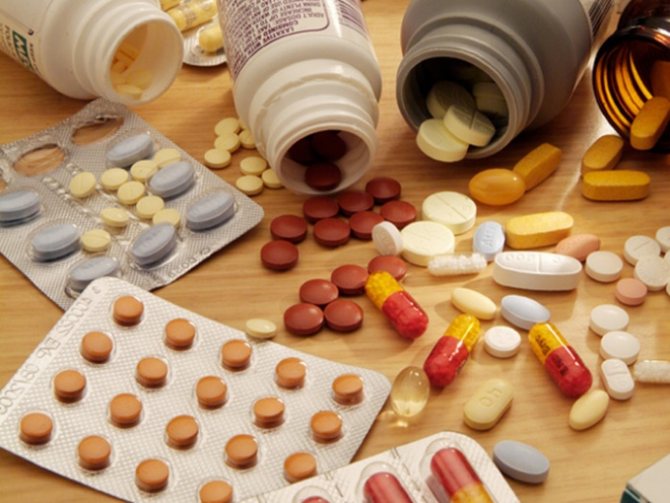
- - drugs;
- -milk;
- -tea;
- -mineral water;
- - sour juices;
- -carbonated drinks;
- -water.
- "Letidor"
- How to take the pill?
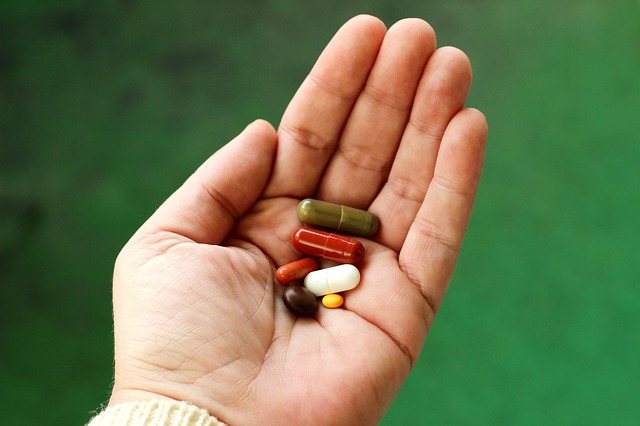
The main reason why doctors categorically do not recommend combining tablets with any drinks is that teas, fruit drinks and other drinking options can negatively affect the effect of the medicine. Some types of drinks enhance the activity of drugs, while others inhibit them and remove the drug from the human body before it begins to act. In addition, if you take the tablets with anything other than plain water, you may experience drug poisoning.
Precautionary measures
When being treated with paracetamol, a nursing woman should take certain precautions:
- Do not take the medicine if the pain is not severe or the temperature is below 38 degrees.
- Do not use the drug for more than three days to avoid the possibility of toxins accumulating in the baby’s body.
- Do not prescribe paracetamol yourself, but be sure to consult a doctor. There is a possibility that another drug may be needed.
- Do not drink alcohol during treatment, as in this case the possibility of negative effects associated with the functioning of the liver and kidneys increases sharply.
- Do not exceed the required number of tablets per day. The dosage of the drug during guardianship is 1.5 g per day, that is, 3 or 4 tablets daily.
- If you suspect pregnancy, be sure to consult a specialist. Since there are studies indicating a negative effect of this medicine on the production of testosterone in unborn boys. This applies to long-term use of the drug in large doses.
In what cases is it necessary to urgently consult a doctor?
Mom should consult a doctor immediately in the following cases:
- If side effects occur in her or the baby.
- If there is no positive dynamics in the fight against the disease after three days of taking the drug.
Content
The instructions for taking any medicine contain instructions for a reason when to take the drug: on an empty stomach, before or after meals. Unsuccessful combinations can either completely neutralize the effect of the drugs or seriously harm your health. Sometimes the interaction of drugs and food can be not just poisonous, but even fatal for a person.
There are at least 200 drugs whose effectiveness or toxicity is influenced by food. Here are the most common combinations.
Analogues of paracetamol for hepatitis B
Other medications that include paracetamol can help a nursing mother cope with pain and fever:
- "Panadol" (tablets);
- "Efferalgan" (in the form of syrup or suppositories);
- "Cefekon D" (suppositories);
- "Perfalgan" (in the form of a solution for infusion).
In addition, combination drugs that are allowed during lactation include, in addition to paracetamol, other substances: Tempalgin, Coldrex, Pentalgin, and so on.
Useful combinations of foods and medications↑
Some diuretics help remove potassium from the body. This is dangerous for the heart and can cause arrhythmia. During treatment with these drugs, dried fruits (dried apricots, figs) and bananas are very useful, because they contain a lot of potassium.
Vitamins A, D and E, antimicrobial drugs based on metronidazole and antifungal agents with griseofulvin are absorbed by the body only together with fats. In addition, foods enriched with fats should also be on the menu of people taking benzodiazepine tranquilizers. The same applies to anticoagulant drugs that reduce blood clotting.
If your doctor has prescribed you a theophylline-based asthma medication, eat more carbohydrates. Cereals, legumes, honey, fruits (both fresh and in the form of juices) promote the absorption of this drug and can actually make the treatment more effective.
The absorption of vitamin PP (nicotinic acid) is improved under the influence of cottage cheese, meat, fish and eggs.
For iron deficiency anemia, natural sources of vitamin C are very useful: oranges, strawberries, rose hips, currants, red and green peppers. They promote the absorption of iron supplements and, consequently, increase hemoglobin levels.
What to do if you have ARVI?
If mommy gets sick, she needs to immediately start fighting the disease so as not to infect the baby. To do this, you can perform the following procedures:
- Drink plenty of liquids, giving preference to water, fruit drinks, dried fruit compote, and weak tea.
- Gargle with soda with iodine and herbal decoctions. You can irrigate the throat with Tantum Verde or use Lugol's solution for lubrication.
- Rinse your nose using saline solution, products made on the basis of sea water, or soda solution.
- If the baby is not allergic, brew fresh raspberries or currants, or eat raspberry or currant jam. Drink decoctions of medicinal herbs (mint, linden, chamomile, St. John's wort and others). Eat garlic, honey, ginger.
Thus, if the condition of a nursing mother requires the use of paracetamol, you should not refuse it. Take paracetamol when necessary, as women who take this medicine can take care of their children even during illness. However, it is worth remembering that you need to consult a doctor.
Dangerous combinations of tablets with food↑
The interaction of drugs with various foods can not only affect the occurrence of adverse drug reactions, but also be dangerous.
ACE inhibitors (for example, ramipril, captopril), which are prescribed by a doctor for hypertension, dilate blood vessels and increase the level of potassium in the blood. Its excess can even lead to cardiac arrest. Therefore, potassium-rich dried apricots, potatoes, herbs and chocolate are prohibited. They should be completely excluded from your diet to avoid unwanted consequences.
Drugs from the group of monoamine oxidase inhibitors , which are often prescribed to treat depression. While taking these medications, you should temporarily avoid avocados, chocolate, bananas, red wine, cheese, soy, and smoked foods. The listed products contain tyramine, which, under the influence of monoamine oxidase, is converted into an inactive form and accumulates in the body. This leads to increased blood pressure and a severe headache.
Anticoagulants prevent the formation of blood clots. While taking them, try to eat little or no Brussels sprouts, cauliflower, liver, soy, walnuts and zucchini, which also includes fat-rich foods and cranberry juice. All of these foods contain large amounts of vitamin K, which has the opposite effect of anticoagulants. Bleeding may occur as a side effect of this combination.
Theophylline-based bronchodilators
According to pharmacology and pharmacotherapy, the following cannot be combined:
- antibiotics of the tetracycline group and preparations containing caffeine, with milk, kefir, cottage cheese;
- iron supplements - with tea, coffee, milk, nuts, grain products;
- calcium supplements – with carbonated soft drinks and juices containing citric acid;
- antibiotics erythromycin and ampicillin - with fruit and vegetable juices;
- aspirin and medications containing acetylsalicylic acid - with butter, sour cream and fatty foods;
- sulfonamide drugs (sulfamethiozole, etc.) - with herbs, spinach, milk, liver, grain products.
Alkaline foods (milk, vegetables, fruits, berries) enhance the excretion of acidic medicinal substances, for example, salicylic acid derivatives, and enhance the effect of alkaline substances. Acidic fruit and vegetable juices can neutralize the pharmacological effect of some antibiotics (erythromycin, ampicillin, etc.), enhance the effect of salicylates, and slow down the absorption of non-steroidal anti-inflammatory drugs, for example, neproxin.
Milk + vitamin D. Dairy products promote the absorption of drugs based on this vitamin, which poses a danger to the central nervous system.
Read also: When you drink, you don’t remember anything
Milk also weakens the effect of antibiotics, since calcium binds a significant part of them and interferes with absorption. Dairy products, like alcohol, are intolerable when treated with antidepressants.
It is not recommended to snack on grapefruit for most medications. It rarely goes with anything. Certain components of grapefruit juice block the enzyme CYP3A4, which is involved in the metabolism of many modern drugs. Thus, the concentration of the drug in the blood may become unacceptably high, which is fraught with various complications. Grapefruit can increase the toxicity of antibiotics, enhance the effect of benzodiazepine sleeping pills, and lead to a sharp decrease in blood pressure in people taking antihypertensive drugs from the nifedipine group.
It is not recommended to combine grapefruit with statins, drugs that lower blood cholesterol.
Few people know the high danger of combining drugs with alcohol . Especially with antibiotics. Moreover, drinking along with anticoagulants prescribed for the risk of blood clots can lead to a stroke. Vasoconstrictor nasal drops in combination with any alcohol sharply increase blood pressure. The usual dose of paracetamol in combination with a glass of alcohol can cause kidney failure. In combination with cardiac glycosides and diuretics, alcohol can disrupt heart rhythm. This also applies to medications containing alcohol.
Important! Regarding food combinations, consult your doctor during your next visit.
Tea contains tannin, which forms insoluble compounds with many medications and thereby significantly reduces the effectiveness of therapy. This is typical for nitrogen-containing drugs that have an antispasmodic effect, as well as for drugs that have a selective tonic effect on the heart (cardiac glycosides).
Coffee interacts with medications in different ways, depending on their properties. It is not recommended to combine coffee with sedatives, as this may result in anxiety or insomnia. Coffee enhances the effect of psychostimulants. Antibiotics, antidepressants and birth control pills block the enzyme CYP1A2, which is responsible for the absorption of caffeine. As a result, this substance stays in the body longer, which is quite unfavorable for the nervous system.
It is best to take medications with drinking water.
